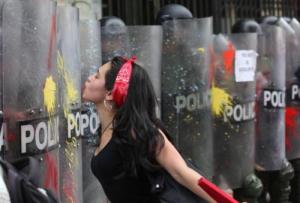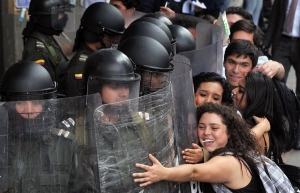Last year was one of action in Colombia. Not because of anything to do with the FARC or drug cartels. No, what Colombia saw last year was students uniting together for a common cause. If any of the Occupy protesters in the US want a lesson in creative, effective, nonviolent protest they need only to look to Colombia. Colombia joined Chile in student protests when the first draft of the proposed reform of Law 30 was announced.
March of last year, President Juan Manuel Santos announced the need to reform higher education. He proposed a reform of the 1992 law, Law 30, a law which deals with higher education. The reform attempted to privatize education by encouraging private investment and by creating for-profit schools.
The students are against the reform of Law 30 for several reasons. The law would allow private investors to fund public universities which would force students to acquire debt and decrease public resources. Some students say that private funding is a step toward corporate control of the education system. Sara Yaneth Fernandez, vice-president of the Association of Professors for the University of Antioquia, was quoted saying, “Public education has a social interest. Private organizations have personal profit interests,” adding, “We are against changing the essence of the public universities in Colombia.”
The law would also increase the number of students in the classrooms which would mean the student to teacher ratio would increase and students would have less access to supplies. The students call this a ‘promotion of mediocrity’ by threatening the quality of education. Students also protest that the law reform would discourage education to develop skills for innovation and self-transformation. They say that they would be taught ‘to push the button, not to create the machine that made it’. Students are also concerned that subjects like humanities would be seen as ‘unprofitable’ and be dropped. The law would turn education into a product rather than a right. Justifiably, this proposed reform made students across the country irate and they took to the streets to voice that anger.
On April 7, thousands of students and teachers took to the streets of Medellin, and even more nation wide, in opposition to the education reforms. They closed down several main streets in the city. As a result of the protests the Minister of Education, Maria Fernanda Campo, said she would open a national debate with students. Later in August, after much public unrest regarding Law 30, President Santos promised to withdraw the for-profit section of the proposal of the reform. However, on September 7th thousands of students took to the streets in Bogotá to continue protesting Law 30. The students stated that the Law was still an attack on education.
President Santos presented the bill to Congress on October 4th, however, the bill seemed to not reflect any prior deliberations or debates, it only exhibited the government’s interests. That week the President addressed the student protests and reaffirmed the government’s commitment to the proposal of reform of Law 30. He criticized the students who continued to protest saying, “there is no worse deaf person than one who doesn’t want to hear.”
Following President Santos’ actions, on October 12th, there was a huge nationwide protest against Law 30. In Bogotá, 30,000 marched in the streets to Plaza Bolivar. Riot police clashed with protesters and used tear gas to attempt to disperse the protesters. In Medellin, 10,000 marched in the streets, nationally over 250,000 students took to the streets. Tragedy found the protests that day when a medical student in Cali fell down during the protest and activated a potato bomb which killed him. While a small minority of protesters resorted to violence and vandalism, the majority of the protesters across the country remained nonviolent and peaceful. The students gave the government the deadline of November 10th to completely withdraw the bill or they would block major streets in all participating cities.
By the end of October students nationwide were on strike and not attending classes or school activities, instead they were on the streets trying to defend their right to education. They did so peacefully and creatively by having a hug-a-thon where they hugged police instead of confronting them. They had a besatón where they blocked major city streets by kissing each other. They organized flashmobs in malls and open canelazos, a national beverage used to gather people around the fire which incited public deliberation. There protests were peaceful, creative and persistent.
On November 9th President Santos offered to withdraw the proposal of Law 30. Still it was no enough for protesters who were out on the streets in protest the following day. Bogotá saw over 20,000 students on the street protesting, despite the rain. The students said they would continue to protest until the law was actually withdrawn.
Then in the middle of November, after students had been on strike for five weeks, the Congress voted to withdraw reform of Law 30. Students and activists hailed the vote as a victory. The National Alternative Education Board said in a statement, “there were three conditions – first, that this reform package was withdrawn; second, that the government showed a willingness to build a new reform package, and lastly that there were guarantees regarding finishing the semester. All this has been accepted by the government and so we will end the strike right now.” While students vowed to return to class, and ninety percent did, there will still some who did not view this as a victory. Students at University of Antioquia, for example, felt that there were more demands to be met.
For those of us that study social movements or even those of us that have been following the failing ‘Occupy’ protests, Colombia’s students were victorious. Despite what the Colombian government may say the protesters had clear demands, they were persistent and despite a very small percentage they were peaceful and nonviolent. The government met their demands and the protesters ended their strike and returned to school. Yet, no social movements are ever completely over, there is always a next step. With this movement the protesters must make sure that the government does not try to implement the proposed reforms in another matter. Regrettably, I believe that Colombian students will have to take to the streets again in order to defend their education, but hopefully not in the near future.


